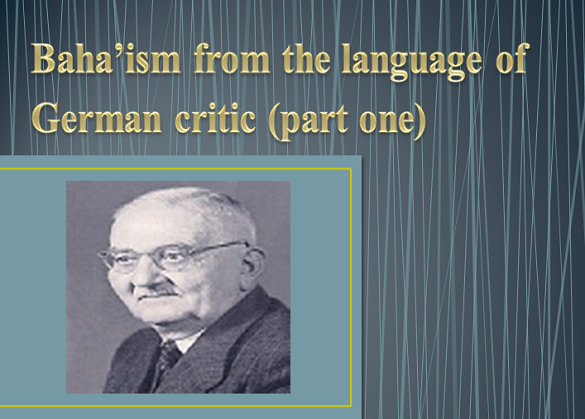
Hermann Roemer, a protestant clergyman and prolocutor, was born in Stuttgart Germany on July, 1880. Roemer was studying at theology and philosophy colleges of Tubingen and Hall universities during 1898 to 1902 and was profited by well-known masters and professor such as Haring, Hegler, Koller, Reichle, Schlatter, Sebold. After finishing his education, he became a master of theology there. He was active in protestant seminars about religion recognition in Stuttgart. Suggested by the Theology College of Tubingen, he became the chairman of the specialized and research seminars of the Bible.
In expressing his research objectives, Herman Roemer points out that “I witnessed the establishment of the Stuttgart’s Baha’i Association in 1907, feeling always the need for a scientific research for responding the propaganda of Baha’ism in Germany.”
Thus, Roemer authored his book under the heading “Babism and Baha’ism, a Research in History of Islamic Denominations” (Die Babi- Behai, Eine studie zur religionsgeschichte des Islams). His book was in fact his Ph.D. treatise presented to the Supreme College of Philosophy of Tubingen University. The book was not first one about Babism and Baha’ism; in 1908, he wrote an article criticizing Baha’ism. Following research regarding history of religious propaganda in Germany, he also wrote an article entitled “Propaganda of Islamic Religions in Western Lands”. In 1012, a similar book by Roemer titled “Babism and Baha’ism, the Last Sects Separated from Islam” was published.
Roemer’s works were the first main ones about Babism and Baha’ism published in Germany; in addition to historical studies, they contained vast research in criticizing and reviewing Babi and Baha’i teachings.
The book “Babism and Baha’ism, a Research in History of Islamic Denominations” mainly reviews fundamental principles of the Babi ad Baha’i teachings in recognizing God, manifestation, status of human and salvation. In criticizing and reviewing the teachings of Babism and Baha’ism philosophically and verbally, his works had been mainly influenced by the style and thinking of “Ignác Goldziher” (Hungarian scholar).
Among the research resources of Roemer’s book are the works of Gubino, Brown, Goyard, Noldekeh, Howart, Oenhiem, Goldziher, Nicola, Nickelson, Kebler, Kremer, Tichter, Oldenberg, Zibold, Schreiner, Ziller as well as the works of Baha’i writers and the reports of religious missionaries from Iran. The Roemer’s book has also been used and cited by many researchers largely including Rosencrantz, Falasha, Paul Verlain, Richard Shaffer, and Ficicchia. In her book “DER information als method”, Nicola Tawfiq an outstanding Baha’i researcher from Germany says that the Roemer’s work is a unique document form his period in German-speaking Europe, and undoubtedly, it is of great importance historically and can be used as a direct source for Babi and Baha’i studies.
Hermann Roemer’s book consists of four chapters and two appendices, the first of which is the longest part of the book. The writer in this chapter deals with discussions about the beginning of Babi movement to the issue of the succession of Ali Mohammad Bab. In this chapter, Roemer brings up issues like the foundation of Babism in Shaykhism, description of the Bab’s position as full Shia in Shaykhism votes, historical review of gnostic inclinations in Babism, the penetration of Kabbalism teachings in Babism, reviewing of Babism approach regarding prophecy, the application of Interpretation in Babi works and the political element in that movement. The book’s second chapter reviews the role of Mirza HHossein Ali Nouri in changing the form of the Babi community during his staying in Baghdad and Edirne. In this section, the writer also deal with discussions like examining his works in Baghdad, his influencing from Sofia, his tablets and writings and the internal and external position of the Babi community.
The book’s third chapter is devoted to the formation of the Baha’ism in Acre and the criticism of some Baha’i rulings and topics such as the formation of the Most Holy Book, criminal law in the Baha’ism, the study of Hossein Ali Nouri’s works in Acre, the formation and developments of the sect in Iran and the relations of the Baha’is in Iran. The writer in the fourth chapter deals with the leadership of Abdu’l-Baha till 1908 and political-historical debates of Baha’ism under the titles such as Abbas Effendi, the sect’s leader and his role in development of Baha’ism, Abbas Effendi and sectarian teachings, the Baha’i propaganda in Europe and America, the performance of Abdu’l-Baha in Iran’s Constitutional Revolution .
Authored by Lotfollah Lotfi
To be continued





